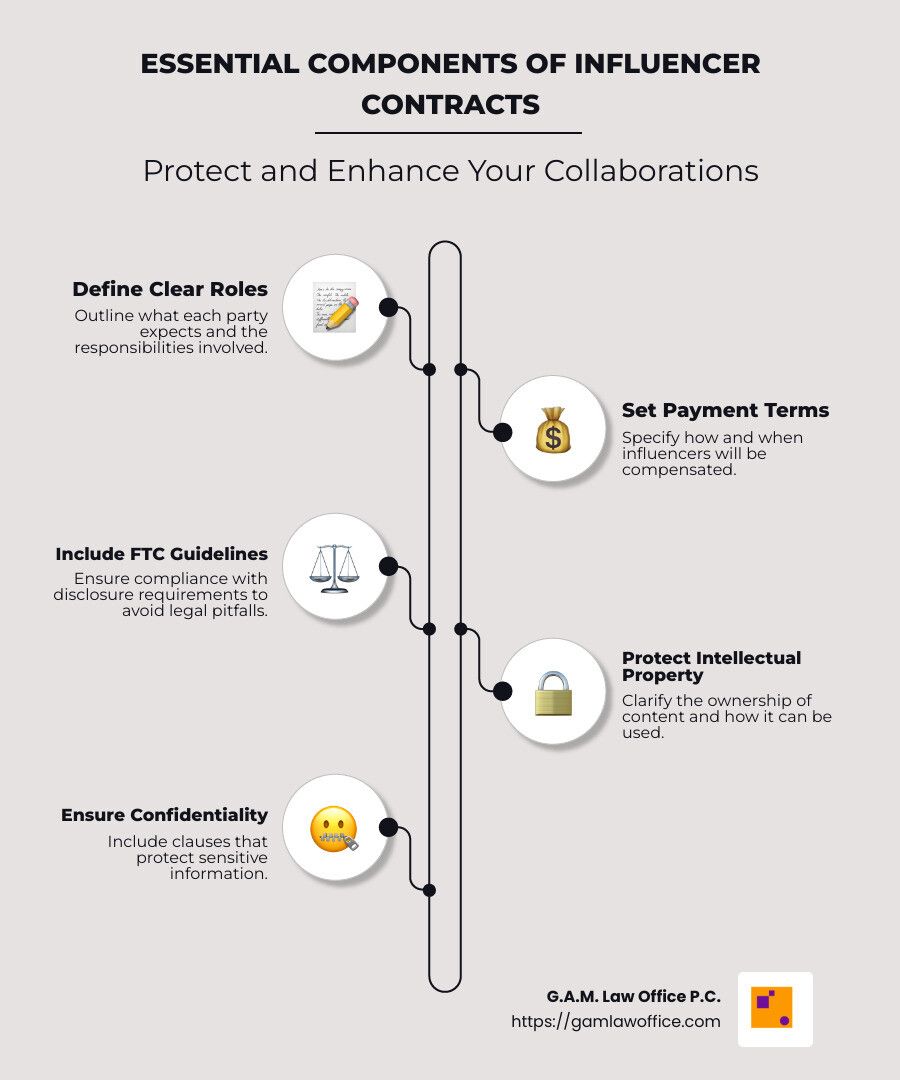- within Media, Telecoms, IT and Entertainment topic(s)
- in United Kingdom
- within Wealth Management topic(s)
Contract for instagram influencers is essential for protecting both influencers and brands in today's digital marketing field. These agreements set the stage for successful collaborations, ensuring clear expectations and fair compensation. Whether you're a brand seeking to amplify your reach or an influencer promoting the latest trends, understanding the ins and outs of these contracts is key.
Key Takeaways:
- Define Clear Roles: Outline what each party expects and the responsibilities involved.
- Set Payment Terms: Specify how and when influencers will be compensated.
- Include FTC Guidelines: Ensure compliance with disclosure requirements to avoid legal pitfalls.
- Protect Intellectual Property: Clarify the ownership of content and how it can be used.
In the evolving world of social media, influencer contracts are crucial. They serve not only to safeguard partnerships but also to cement trust and transparency between brands and influencers. As we dig deeper, you'll find how carefully crafted agreements can be a game-changer for your brand's success.

Understanding Influencer Contracts
Influencer contracts are the backbone of any successful collaboration between a brand and an influencer. They provide a clear framework that outlines roles, duties, pay, and expectations, ensuring both parties are on the same page. Let's break down the essential components.
Roles and Duties
First and foremost, a contract for Instagram influencers must clearly define the roles and responsibilities of each party. This involves specifying what the influencer is expected to create, such as posts, stories, or videos, and how often these should be published. It's crucial to outline these duties to avoid misunderstandings and ensure that both the brand's and influencer's goals align.
Pay and Compensation
Compensation is a critical part of any influencer agreement. It's not just about the amount but also the method and timing of payments. Typically, contracts will detail whether influencers are paid per post, receive a lump sum, or are compensated through other means like free products.
To prevent disputes, it's wise to clearly outline payment terms, including deadlines and payment methods. This clarity helps maintain a positive working relationship and ensures influencers are paid fairly and on time.

Expectations and Framework
Expectations go beyond just content creation. They include the tone, style, and message that the influencer should convey. Brands often provide detailed brand guidelines to ensure the influencer's content aligns with their image and values. Additionally, brands might send promotional products for influencers to showcase in their posts.
A well-drafted contract will also touch on intellectual property rights, clarifying who owns the content and how it can be used. This helps avoid any future disagreements over content ownership.
Crafting the Framework
The framework of an influencer contract should also address exclusivity and confidentiality. Exclusivity clauses restrict influencers from working with competing brands, while confidentiality agreements protect sensitive brand information. These elements are essential for maintaining trust and protecting brand integrity.
By understanding these components, both brands and influencers can forge strong partnerships that are mutually beneficial. An effective influencer contract is more than just a legal document; it is a roadmap to a fruitful collaboration.
We'll explore how to create a robust influencer agreement that stands up to legal scrutiny and fosters successful partnerships.
Key Components of a Contract for Instagram Influencers
When crafting a contract for Instagram influencers, include several key components to ensure a smooth and successful partnership. Let's dive into these essential elements.
Compensation
Compensation is more than just a paycheck. It's about defining how and when influencers will be paid. Common methods include per-post payments, lump sums, or even commissions on sales. Some influencers might prefer a retainer, which provides a steady income over time.
To avoid misunderstandings, the contract should specify payment terms, including due dates and methods. This clarity helps maintain a positive relationship and assures influencers of timely and fair compensation.
Intellectual Property
Intellectual property (IP) rights are crucial in influencer contracts. They determine who owns the content created during the partnership. In some cases, the brand might own the content, allowing them to use it for marketing beyond social media. Alternatively, influencers may retain ownership, limiting the brand's usage.
Clearly defining IP rights in the contract prevents future disputes and ensures both parties understand how the content can be used.
Exclusivity
Exclusivity clauses are another critical component. These clauses restrict influencers from promoting competing brands during the contract term. While exclusivity can protect a brand's interests, it should be reasonable and not overly restrictive.
It's essential to compensate influencers fairly for any exclusivity requirements, as these can limit their earning potential from other partnerships.
Confidentiality
Confidentiality agreements protect sensitive information shared between the brand and influencer. This might include marketing strategies, product details, or upcoming campaigns.
By including a confidentiality clause, both parties agree to keep shared information private, safeguarding the brand's competitive edge and maintaining trust.
By incorporating these components into a contract, brands and influencers can establish a solid foundation for their collaboration. Next, we'll explore how to create a strong influencer agreement that meets legal standards and fosters successful partnerships.
How to Create a Strong Influencer Agreement
Creating a robust influencer agreement is essential for protecting both your brand and your influencer partners. Here's how to ensure your agreement is comprehensive and legally sound.
Written Agreement
A written agreement is the backbone of any influencer partnership. It provides a clear, documented understanding of the roles, responsibilities, and expectations of both parties. This written document serves as a reference point and helps prevent misunderstandings or disputes.
Legal Binding
For an agreement to be legally binding, it must include specific elements. These typically involve clear identification of the parties involved, detailed descriptions of the services to be provided, and the agreed compensation. Both parties must sign the agreement to affirm their consent and understanding.
By ensuring your influencer agreement is legally binding, you protect your brand from potential legal disputes and misunderstandings. This also reassures influencers that their rights and interests are safeguarded.
FTC Guidelines
Complying with FTC guidelines is non-negotiable in influencer marketing. These guidelines require influencers to disclose any material connections with brands clearly. This means if an influencer receives any form of compensation or benefit, they must disclose this relationship to their audience.

Brands must ensure that influencers understand and adhere to these guidelines. Failure to comply can result in penalties for both the brand and the influencer. Including explicit instructions on FTC compliance in your contract helps avoid these pitfalls.
Disclosure Requirements
Disclosure requirements are a crucial part of maintaining transparency and trust with your audience. The FTC mandates that disclosures be clear, conspicuous, and in the same format as the content (e.g., visual or verbal).
For instance, if an influencer's post is in English, the disclosure should also be in English. It should be easily noticeable and not hidden in a sea of hashtags or buried in the post description.
Including specific disclosure requirements in your agreement not only aligns with FTC guidelines but also reinforces your brand's commitment to ethical marketing practices.
By focusing on these key areas, you can create a strong influencer agreement that not only meets legal standards but also sets the stage for a successful and transparent partnership. Next, we'll dig into best practices for nurturing fruitful influencer relationships.
Best Practices for Influencer Partnerships
To build successful relationships with influencers, it's crucial to follow some best practices. Let's explore three important aspects: morality clauses, promotional products, and brand guidelines.
Morality Clause
A morality clause is an essential part of any influencer agreement. This clause helps protect your brand from negative publicity by setting expectations about the influencer's behavior. It outlines actions or behaviors that could lead to termination of the partnership. For example, if an influencer engages in activities that could harm your brand's reputation, the morality clause allows you to end the agreement.
Including a morality clause in your contract ensures that both parties understand the importance of maintaining a positive public image. It also provides a clear framework for addressing any issues that may arise.
Promotional Products
Offering promotional products can be a great way to kickstart your partnership with an influencer. By providing your products for free, influencers can test them and create authentic content. This not only helps build trust with their audience but also ensures that the influencer genuinely likes and uses your products.
When including promotional products in your agreement, be clear about what you expect in return. Specify the type of content the influencer should create (e.g., reviews, unboxings) and any specific hashtags or links to include. This clarity helps both parties understand the goals and deliverables of the partnership.
Brand Guidelines
Clear brand guidelines are crucial for maintaining consistency and ensuring that the influencer represents your brand accurately. These guidelines should cover aspects like tone of voice, color schemes, logos, and any specific messages you want to convey.
By providing detailed brand guidelines, you help the influencer align their content with your brand's identity. This not only ensures that the influencer's posts reflect your brand's values but also improves the overall effectiveness of the campaign.
Make sure to communicate these guidelines clearly and include them in the influencer contract. This way, both parties have a mutual understanding of the brand's expectations and can work together to achieve the desired outcomes.
Following these best practices helps create a strong foundation for your influencer partnerships. By incorporating morality clauses, offering promotional products, and providing clear brand guidelines, you set the stage for successful and respectful collaborations. Next, we'll address some frequently asked questions about influencer contracts.
Frequently Asked Questions about Influencer Contracts
What is a typical influencer contract?
A typical contract for Instagram influencers varies based on the influencer's reach. Nano-influencers have smaller followings, usually between 1,000 to 10,000. They often work with brands for free products or lower fees. Micro-influencers have 10,000 to 100,000 followers and typically charge more due to their niche appeal and higher engagement rates. Mid-tier influencers with 100,000 to 500,000 followers and macro-influencers with over 500,000 followers command higher fees and more detailed contracts. These contracts outline deliverables, timelines, and compensation, ensuring both parties are clear on expectations.
How much should Instagram influencers charge?
The amount Instagram influencers charge depends on their follower count and engagement rates. Brands might pay commission rates based on sales generated through the influencer's posts. This method ties payment to performance, ensuring that influencers are motivated to engage their audience. However, fixed fees are also common, especially for influencers with a proven track record of audience trust and engagement. As the influencer marketing industry grows, benchmark rates are becoming more standard, but negotiations are still key to establishing fair compensation.
Why is a written influencer contract important?
A written influencer contract is crucial for several reasons. It provides a legal framework that protects both parties. If payment disputes arise, the contract serves as evidence of agreed terms, helping influencers pursue legal action if necessary. Similarly, if an influencer fails to deliver promised content, the client can use the contract to support their claims. Written agreements offer security and clarity, reducing misunderstandings and ensuring that everyone knows their rights and responsibilities.
Understanding these elements helps both brands and influencers create effective and fair partnerships. With clear contracts, both parties can focus on building successful campaigns without worrying about potential conflicts.
Conclusion
Navigating influencer agreements can be complex, but with the right guidance, it becomes a powerful tool for brand success. At G.A.M. Law Office P.C., we specialize in providing custom legal counsel custom to the unique needs of businesses, artists, and creatives. Our expertise in business, trademark, and copyright law ensures that your influencer contracts are not just legally sound but strategically crafted to protect and grow your brand.
Our approach emphasizes strategic advice and transparent communication, ensuring that every contract aligns with your business goals while safeguarding your interests. Whether you're working with nano-influencers or macro-influencers, having a robust, well-drafted contract is essential to avoid disputes and foster productive partnerships.
The content of this article is intended to provide a general guide to the subject matter. Specialist advice should be sought about your specific circumstances.


